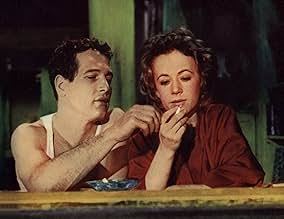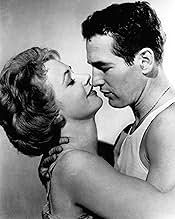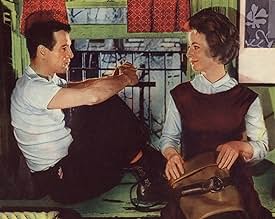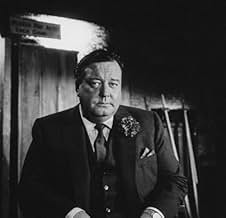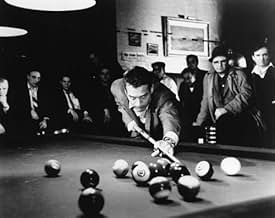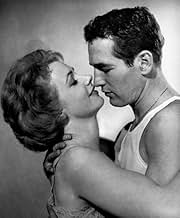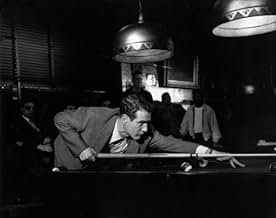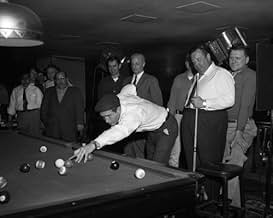An up-and-coming pool player plays a long-time champion in a single high-stakes match.An up-and-coming pool player plays a long-time champion in a single high-stakes match.An up-and-coming pool player plays a long-time champion in a single high-stakes match.
- Won 2 Oscars
- 13 wins & 21 nominations total
- Turk
- (as Cliff Pellow)
- Old Doctor
- (uncredited)
- Bartender
- (uncredited)
- Waiter at Parisien Restaurant
- (uncredited)
Storyline
Did you know
- TriviaPaul Newman and Jackie Gleason established a friendship on the set. At one point, Newman got a little cocky about his newfound pool skills and challenged the much more experienced Gleason to a $50 bet on a game. Newman broke, then it was Gleason's turn. He knocked all 15 balls in and Newman never got another shot. Gleason recalled that the next day Newman paid him off with 5000 pennies.
- GoofsDuring the last pool match, second game, Minnesota Fats has taken his jacket off, loosened his tie and unbuttoned his vest, but one subsequent shot shows him with his tie tightened and wearing a buttoned vest and jacket.
- Quotes
[Fast Eddie is bothered because Bert called him a born loser]
Fast Eddie: Cause, ya see, twice, Sarah... once at Ames with Minnesota Fats and then again at Arthur's, in that cheap, crummy pool room, now why'd I do it, Sarah? Why'd I do it? I coulda beat that guy, coulda beat 'im cold, he never woulda known. But I just hadda show 'im. Just hadda show those creeps and those punks what the game is like when it's great, when it's REALLY great. You know, like anything can be great, anything can be great. I don't care, BRICKLAYING can be great, if a guy knows. If he knows what he's doing and why and if he can make it come off. When I'm goin', I mean, when I'm REALLY goin' I feel like a... like a jockey must feel. He's sittin' on his horse, he's got all that speed and that power underneath him... he's comin' into the stretch, the pressure's on 'im, and he KNOWS... just feels... when to let it go and how much. Cause he's got everything workin' for 'im: timing, touch. It's a great feeling, boy, it's a real great feeling when you're right and you KNOW you're right. It's like all of a sudden I got oil in my arm. The pool cue's part of me. You know, it's uh - pool cue, it's got nerves in it. It's a piece of wood, it's got nerves in it. Feel the roll of those balls, you don't have to look, you just KNOW. You make shots that nobody's ever made before. I can play that game the way... NOBODY'S ever played it before.
Sarah Packard: You're not a loser, Eddie, you're a winner. Some men never get to feel that way about anything.
- ConnectionsFeatured in Portrait of an Actor (1971)
Eddie is the youngster hungry for glory. He and Charlie pose as salesmen and Eddie feigns drunkenness, hooking the punters by repeating an almost-impossible shot. For all the slickness of the con, Eddie is impatient for bigger things. He wants to challenge Minnesota Fats, the best hustler in the land.
Newman gets his name above the title, but this is a film with four exquisite pieces of acting. Jackie Gleason as Minnesota, Piper Laurie as Sarah and George C Scott, playing Bert Gordon, turn in wonderful performances.
Eddie matures as the story progresses. He starts as a cheap chiseller, hustling ten bucks, but ambition carries him to Louisville and the world of the high rollers. Sarah's love opens emotional dimensions in him which he previously lacked. Bert Gordon confronts him with his own spiritual inadequacies, forcing him to understand himself. Eddie is jejune in the first game against the Fat Man, but by the second meeting he is emotionally strong, and completely his own man. He has made the spiritual journey from the whining "everybody wants a piece of me" to the inner knowledge that Sarah bequeathed him - that only those who give can truly live.
Bert Gordon, with his dark glasses and hawkish features, is a creature of the night. Loving the 'action' of a clash of talents, but lacking any talent of his own, Gordon is the predator on the sidelines. Hearing of the new hustler's presence, Gordon arrives soundlessly and sits watching intently for hours. His dark genius sees the weakness in every soul. In the bar, when he and Eddie talk business, Gordon is foreshortened to look tiny alongside the talented youngster. For all his money and sharp wits, Gordon will never be more than a parasite living off the ability of others. Finally, Eddie and Fats walk into the sunlight, heroes who have proved themselves. Gordon remains perched on his gloomy barstool, a prisoner in his own dark kingdom.
If Sarah is the vulnerable, physically-disabled woman who relies on drink too heavily, the victim of the men she encounters, she is also the heart of the movie. She destroys Gordon's certainty and she shows Eddie the meaning of love. Her tragedy is Eddie's salvation. She and Eddie find each other in a deserted bus station in the dead hours. They are both lost souls, Citizens of Hell. She is the deformed girl with the empty life, and he is the emotional cripple with no resources of education or character to sustain him. They cling to each other as if shipwrecked. When the seduction comes, Sarah hesitates. She knows this will lead to suffering. "Why me?" she asks, then surrenders to her fate.
The time when Eddie's hands are in plaster is Sarah's brief season of happiness. She stops drinking and even makes progress with her writing. Somebody needs her, belongs completely to her. It cannot last.
"I made you up, Eddie," Sarah tells him, and in a sense she did. She imagined him to be loyal and stable. On the night when the truth dawns, Sarah goes from feeling pretty in her new dress to being a rain-sodden wreck. She is supplanted in Eddie's attention by the sinister Gordon, who asserts the new power-balance in the railroad dining-car. The hotel suites are adjoining, and though Sarah closes all the doors, she can't keep Gordon out. By Findlay's party, she has hit the bottle again. The patterned dress which Eddie bought her, a symbol of her incarceration, has the shadow of the ballustrade projected onto it, seemingly magnifying her sense of ensnarement.
Though Jackie Gleason does very little in this film, he dominates it. On screen for a fraction of the film's totality, and having neither great speeches nor grand gestures, he impresses by his sheer presence. Stillness, self-containment and an ironic amusement make Minnesota Fats the perfect foil for the angry, ambitious Eddie. In the final showdown, Fats' quiet poise outshines the grandstanding of the others. Gleason conveys beautifully the fear at the core of this big dandy. When Eddie has him in trouble, the Fat Man begins to lose his sartorial integrity as his confidence unravels.
This contrast of stillness and motion is effective in the first meeting of the hustlers. Fats and Gordon, who know what they are about, remain motionless and tranquil. Eddie the incontinent wannabe gradually loses control of both mouth and limbs. The film is rich in symbolic language. The cheap rooms which Eddie rents are mere boxes for hire, like the bus station locker which he lives out of. When he and Sarah meet for the second time, the inevitability of their coupling is conveyed in a scene without words or gestures. Eddie's plastercasts are manacles - without his hands, he is nothing. A sumptuous restaurant and a happy couple are transformed when the brutal truth emerges. The camera angle is reversed, and Eddie and Sarah are now separated by gaunt shelves of crockery. The illusion has been shattered. When Eddie sneaks out on the sleeping Sarah with the stake money in his hand, it is the betrayal of Charlie re-enacted.
A marvellous film is enhanced by a superbly sleazy jazz score (Kenyon Hopkins) and the violence is all the more gut-wrenching for being suggested, rather than shown.
Verdict - probably a masterpiece.
Details
Box office
- Budget
- $2,125,000 (estimated)
- Gross worldwide
- $8,072
- Runtime2 hours 14 minutes
- Color
- Aspect ratio
- 2.35 : 1
Contribute to this page




